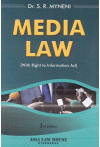- Author(s): Dr. S.R. Myneni
- Publisher: Asia Law House
- Edition: 3 Ed 2020
- ISBN 13 9789389286366
- Approx. Pages 552 + Contents
- Format Paperback
- Approx. Product Size 24 x 16 cms
- Delivery Time Normally 7-9 working days
- Shipping Charge Extra (see Shopping Cart)
.............................................................................................................................
Description
It happened to the author to complete the course of P.G. Diploma in Journalism and Mass Communication in 1997 June. In 2001 June, the author, along with a friend, Moturi Venkateswara Rao (Journalist) visited the Rachana Journalist College in Hyderabad and interacted with the then Principal, Dr., Govindaraju Chandradhar. Then a thought of writing a book on 'Media Law' flashed and started to collect some study material. But it was not materialised as he was involved in writing books for various subjects of Law Courses. Suddenly Shri Sunil Gogia, M/s. Asia Law House, Hyderabad put a proposal of writing a text book on Media Law as there were not many text books on that subject. At the same time, the author attended the two-day international Seminar on "Changing Face of India Media: What Needs to be done?" on March 21-22, 2012 at Centre for Economic and Social Studies, Hyderabad. In that Seminar, many delegates expressed the need of books on Media Laws'.
.............................................................................................................................
Contents
Unit I : Mass Media
Chapter 1 Mass Media Meaning
Chapter 2 Classification or Types of Mass Media
Chapter 3 Ownership Patterns of Mass Media (Organisational Structure and
Management of Mass Media in India)
Chapter 4 Difference between Visual and Non-visual Media
Chapter 5 Functions or effects or impact or importance of Mass Media on People
Chapter 6 Self-regulation or Code of Ethics for Persons in Mass Media in India
Unit II : Press
Chapter 1 Press in India
Chapter 2 Freedom of Speech and Expression
Chapter 3 Freedom of Press
Chapter 4 Press and Registration
Chapter 5 The Press Council Act, 1978 and the Relevant Rules
Chapter 6 Laws Relating to Newspapers
Chapter 7 Advertisement - Is it included in freedom of speech and expression?
Chapter 8 Law relating to Working Journalists
Chapter 9 Law of Defamation, Obscenity, Blasphemy and Sedition [Indian Penal Code, 1860]
Chapter 10 Provisions Relating to Press from Various Acts
Chapter 11 Law of Copyright
Unit III : Films
Chapter 1 Role of Drama and the Dramatic Performance Act, 1876
Chapter 2 Origin and Impact of Films
Chapter 3 Film Censorship
Chapter 4 Cinematograph Act, 1952; Cinematograph (Certification) Rules, 1983 and
Guidelines for Certification of Films for Public Exhibition
Chapter 5 The Cinematograph Film Rules, 1948 and the Cinema Carbons (Control) Order, 1961
Chapter 6 Law Relating to Cine Workers Welfare
Chapter 7 The Cine-Workers and Cinema Theatre Workers (Regulation of
Employment) Act, 1981 and The Cine-workers and Cinema Theatre
Workers (Regulation of Employment) Rules, 1984
Unit IV : Electronic Broadcast Media (Radio and Television)
Chapter 1 Electronic Broadcast Media
Chapter 2 Radio, an Electronic Broadcasting Medium
Chapter 3 Effects of Television on People
Chapter 4 Committees appointed by the Government to advise on broadcasting media
Chapter 5 Government Policies
Chapter 6 Judicial Review of Doordarshan Decision : Freedom to Telecast
Chapter 7 Constitutional Restrictions on Radio and Television: Subject to
Law of Defamation and Obscenity
Chapter 8 Power to Legislate - Article 246 read with the Seventh Schedule
Chapter 9 The Prasar Bharati (Broadcasting Corporation of India) Act, 1990 and
The Prasar Bharati (Broadcasting Corporation of India) Investment of
Money Rules, 2007
Unit V : Right to Information Law
Chapter 1 Development of the Movement of Right to Information in India
Chapter 2 Salient Features of the Right to Information Act, 2005
Chapter 3 Right to Information and Obligations of Public Authorities
Chapter 4 Procedure for Seeking Information
Chapter 5 The Central Information Commission (Sections 12-14)
Chapter 6 The State Information Commission (Sections 15-17)
Chapter 7 Power and Functions of the Information Commissions, Appeal, Penalties
Chapter 8 Miscellaneous Provisions of the Act and Schedules
Chapter 9 Rules and Regulations Relating to the Right to Information
Chapter 10 Implementation of the Act
Bibliography
Reports, Acts, Rules and Regulations
Subject index
.............................................................................................................................
Author Details
Dr. S.R. Myneni
• Born on 20-8-1939 at Lagadapadu village in Guntur District of Andhra Pradesh to Smt. Annapurnamma and Sri Butchaiah and hails from a respectable farmers' family.
• He had his Primary School Education at his native village; High School Education (1950-56) at Pedakurapadu; Teacher Training (1956-58) at Tadikonda; B.Ed. Training (1965) and B.L. (1990-93) at Rajahmundry (AP). He has acquired his remaining qualifications from Intermediate (1960) to Ph.D. (1 983) and LL.M (1993-95) from different Indian Universities by private appearance.
• He worked in Government Schools as Primary School Teacher (1958-66), Headmaster and Teacher Educator (1966-69). He officiated as an Extension Officer (Edn.) at Ongole Samithi (1969-74). He taught Economics as Asstt. Lecturer (1974-77), Lecturer (1977-87), Reader (1987-97) and Mercantile Law (1998-99) in Government Colleges at Nidadavole, Rajahmundry and Kakinada in AP
• Registered as an Advocate of A.P Bar Council (1998) and became Member of A.P High Court Advocates Association (2001).
• His first book 'International Economic Law' was published in 1996 from then onwards more than 100 text-books for B.A., LL.B., and LL.M., Courses written by him were published by Allahabad Law Agency, Faridabad and Asia Law House, Hyderabad. Some of them are prescribed by some Universities as textbooks/reference books.
• During the year 2015, under the achievement of writing most law text books, his name has been entered in, The Limca Book of Records. The Indian Book of Records, The Golden Book of World Records, and The Unique World Records.
• He visited Moscow (USSR) in 1985 and the USA in 1999.
• He has been associated with Friendship Association and Peace Organization.
• He is the believer of altruism.
.........................................................................................................................

